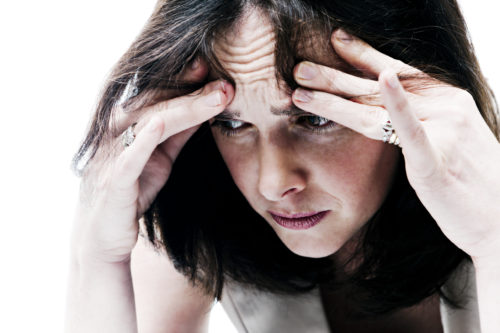Anxiety
Anxiety may be a normal reaction to stress and it can serve as a prompt to deal with difficult situations. However, when anxiety becomes excessive, it may fall under the classification of an anxiety disorder.
The Anxiety and Depression Association of America estimates that almost one out of five people suffer from an anxiety disorder, making it the most common mental disorder in the United States.
Anxiety disorder is characterized by emotional, physical, and behavioral symptoms that create an unpleasant feeling that is typically described as uneasiness, fear, or worry.
The worry is frequently accompanied by physical symptoms, especially fatigue, headaches, muscle tension, muscle aches, difficulty swallowing, trembling, twitching, irritability, sweating, and hot flashes.
Emotional symptoms include fear, racing thoughts, and a feeling of impending doom. People suffering from anxiety often withdraw and seek to avoid people or certain places.
While generalized anxiety disorder is the most common, there are other anxiety disorders, including obsessive-compulsive disorder, panic disorder, phobias, and post-traumatic stress disorder.

Depression
Depression has been called the “common cold of mental illness”, but if you suffer from depression you know how much worse it is than the average cold.
Depression is a serious, but common, illness: One in 10 adults report experiencing depression, and the condition is the most common cause of disability in the United States.
The lifetime risk of any individual person becoming depressed is around 17 percent, and most people have their first bout of depression in their late teens or early twenties.
Depression’s symptoms can vary greatly from person to person and may even change throughout the course of the illness. Symptoms may also vary depending on an individual’s gender, culture, or age.
Adolescents experiencing depression might appear irritable and agitated, and women may be more likely to admit to depression than men, while certain cultural groups might mask their feelings or display them differently.
Common symptoms of depression include:
- Anger
- Anxiety
- Changes in sleep such as excessive sleeping or the inability to sleep.
- Changes in weight or eating habits.
- Difficulty concentrating.
- Difficulty enjoying previously enjoyed activities.
- Feelings of hopelessness and worthlessness.
- Frequent crying and overwhelming feelings of sadness.
- Thoughts of suicide.
- Unexplained physical ailments such as headaches or muscle pain.
More facts about depression:
- Women are 70% more likely than men to experience depression in their lifetime.
- Men and women experience depression differently—while women tend to experience sadness and guilt, men often feel restless or angry and are more likely to turn to alcohol and drugs to cope.
- Only 50% of people actively seek conventional treatment for depression, although a majority of people do find some relief through treatment.
- Depression causes unnecessary suffering and is a risk factor for suicide.
- Women and adults between the ages of 45 and 64 are most likely to meet the criteria for major depression; however, over 3% of youth ages 13-18 have also experienced a debilitating depressive episode.
- While the “classic” form of depression involves lethargy, sleep and appetite disturbance, dark and negative thoughts and lack of interest in life, some depressed people exhibit agitation and anxiety, irritability and/or compulsive behaviors.
Effective Depression Counseling
The good news is depression is also extremely treatable in the hands of an experienced professional. We know, for example, that Cognitive Behavior Therapy (CBT), mindfulness and meditation training, Solution Focused and interpersonal therapy techniques can give a depressed person relatively rapid relief.
We know that medication is sometimes a good choice, and physiological approaches like exercise and light exposure are important, too.
What is unfortunate is that too many depressed people never get help. The general public still thinks depression is something you can overcome through willpower. When people in the midst of a major depressive episode are told this and believe it, they feel too ashamed to seek help. Not only do people go through needless suffering because of this, they risk making their situation worse.
If ignored, a single episode of depression can lead to a life-long struggle with recurring bouts. If you think you may be depressed, the smartest thing you can do for yourself is to seek the help of an experienced counselor or therapist.
Both environmental and physiological factors can cause depression. Most mental health experts now agree that brain chemistry plays a major role. The level of neurotransmitters such as dopamine and serotonin in the brain can affect a person’s risk of becoming depressed.
However, life experiences affect brain chemistry, and some people become depressed after experiencing a trauma or stressful life change such as a separation or divorce the death of a spouse, being laid off from a job, financial instability, relocation, or a decline in health.
Everyday stressors, like social isolation, domestic violence, and the presence of other psychological conditions, can also contribute to depression. Sometimes depression arises as a defense mechanism in order to avoid experiencing painful emotions.
Women who have recently given birth may struggle with postpartum depression in the days, weeks, or months following childbirth.
Depression’s symptoms are distinct from the symptoms associated with grief, when feeling emotionally overwhelmed is normal and temporary. Depression may be indicated when feelings of sadness and despair disrupt daily life and persist for more than two weeks.
Those who have experienced trauma or are prone to anxiety may be more likely to experience depression than those who have not, and research suggests that some people may be biologically predisposed to depression due to neurochemical abnormalities. A family history of depression can lead to a person’s inheriting or learning these traits.
